外语教学与研究出版社高中英语必修1重难点解析
外研版高中英语必修1重要知识点归纳

外研版高中英语必修1重要知识点归纳外研版高中英语必修1是我们学习英语的重要教材,该教材覆盖了许多重要的知识点,本文将对其中一些关键知识点进行归纳总结,以帮助大家更好地掌握这些知识。
一、重要的语法知识点1. 一般现在时:用于描述客观事实、经常性行为或习惯,句子中的主语为第三人称单数时,动词需加s或es结尾。
2. 一般过去时:用于描述过去的事情或经过的经历,动词需要变为过去式,常见的过去式有加-ed或变化不规则的形式。
3. 现在进行时:表示正在进行的动作,主要由be动词+动词的现在分词构成。
4. 一般将来时:表示将来发生的动作,句子中使用will或be goingto来表示。
5. 名词性从句:将一个句子中的名词用另一个句子来替代,从句开头的词有what, where, when, why, how等。
6. 定语从句:用于修饰某个名词,关系代词通常有that, which, who 等。
二、重要的词汇知识点1. 形容词和副词的比较级和最高级:用于描述人或物的性质或程度。
2. 数词:描述数量和顺序的词,包括基数词和序数词。
3. 复合词:由两个或多个词组合而成,具有新的意义,如blackboard, football等。
4. 介词短语:描述位置、方向、时间等,如in front of, on the left等。
5. 动词短语:由动词和副词或介词组合而成,表示一个动作或状态,如look after, think of等。
三、重要的阅读技巧1. 找出关键信息:通过快速阅读文章,找出文章的主题、关键词和关键句,了解文章的大意。
2. 掌握词汇技巧:通过上下文推测词义,了解文章中不熟悉的词汇的含义。
3. 理解句子结构:分析句子的结构,理解句子中各个成分之间的关系,帮助理解句子的含义。
4. 注意段落结构:理解每个段落的主题,通过段落之间的联系理解文章的结构和内容。
5. 提高阅读速度:通过多进行阅读训练,提高阅读速度和阅读理解能力。
(完整word版)外研社高中英语必修一Module1-6所有重点归纳-推荐文档
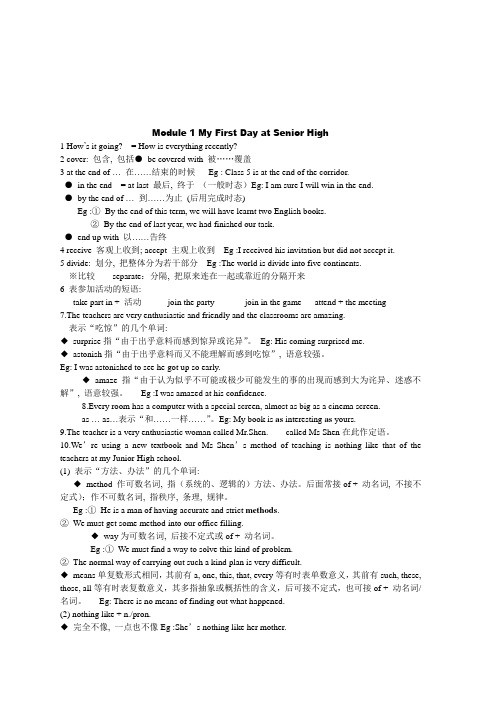
Module 1 My First Day at Senior High1 How’s it going? = How is everything recently?2 cover: 包含, 包括●be covered with 被……覆盖3 at the end of …在……结束的时候Eg : Class 5 is at the end of the corridor.●in the end = at last 最后, 终于(一般时态)Eg: I am sure I will win in the end.●by the end of …到……为止(后用完成时态)Eg :①By the end of this term, we will have learnt two English books.②By the end of last year, we had finished our task.●end up with 以……告终4 receive 客观上收到; accept 主观上收到Eg :I received his invitation but did not accept it.5 divide: 划分, 把整体分为若干部分Eg :The world is divide into five continents.※比较separate:分隔, 把原来连在一起或靠近的分隔开来6 表参加活动的短语:take part in + 活动join the party join in the game attend + the meeting7.The teachers are very enthusiastic and friendly and the classrooms are amazing.表示“吃惊”的几个单词:◆surprise指“由于出乎意料而感到惊异或诧异”。
Eg: His coming surprised me.◆astonish指“由于出乎意料而又不能理解而感到吃惊”, 语意较强。
外研版必修1 Module3重难点归纳

外研版高一英语必修一Module3 重难点归纳重点短语:是...的缩写________________________缺乏... ________________________在20 世纪90 年代________________________超过________________________more than + 名词:________________________ more than+ 形容词/ 副词:_________________过时的,不流行的________________________时尚的,流行的________________________以... 的速度________________________出席开幕式________________________一直,总是________________________把某物提供给某人________________________给某人提供某物________________________=________________________把某物提供给某人=________________________提供某人某物=________________________把某物给某人offer sb. sth. for... ________________________同意某人做某事________________________同意做某事________________________同意某人的意见________________________查阅,涉及到________________________被用来做某事________________________习惯于…________________________过去常常做________________________被用作…________________________重点句型And what a ride! 一次多么美妙的旅行啊!!感叹句的基本结构What 引导的感叹句:①What a/an + 形容词+ 名词(单数可数名词) + 主语+ 谓语!②What +形容词+ 名词(复数可数名词) + 主语+ 谓语!③What + 形容词+ 名词(不可数名词) + 主语+ 谓语!How 引导的感叹句:①How + 形容词/ 副词+ a/an 名词(单数可数名词) + 主语+ 谓语!②How + 形容词/ 副词+ 主语+ 谓语!③How + 主语+ 谓语! e.g.How dangerous the fish is! How lovely a boy he is! How time flies! 光阴似箭!感叹句专项练习1. Look at the smog. _______ bad weather it is!A. HowB. How aC. WhatD. What a2. ____________ great picture! Who painted it?A. HowB. WhatC. How aD. What a3. --- It’s reported that some famous singers will give a performance in Yangzhou.---Wow, ______________.A. how exciting newsB. what exciting newsC. what an excited newsD. how excited the news is4. ___________________great fun they are having in the sitting room!A. WhatB. HowC. What aD. How a5. ______________ great progress he has made this term! He feels _____________.A. What a, excitedB. What, excitedC. How, excitedD. How an, exciting6. —______________ hard work it is!—Yes, but he seems ________ to do it.A. What a, happyB. What, happyC. What a, happilyD. How, happy7. ____________ enjoyable sports news program on Channel 1!A. HowB. How anC. What anD. What8. -- _______ you’ve made! But you should still work harder.-- Thank you, I will.A .What a big mistake B. How big mistakes C. What great progress D. How great progress9. --_______ lovely dress! ---It ______________ by my sister.A. How; makesB. How a; madeC. What a; was madeD. What; is making10. —Mother’s Day is coming. Here is a pair of jeans for you, Mum.— ____________ beautiful blue jeans! Thank you, Amy.A. How aB. HowC. What aD. What语法要求:一:动词的过去分词作表语和定语二:一般过去时用法:基本用法在初中已经总结过,在此补充一些常与一般过去时连用的时间状语。
外研版高中英语必修1 Module1 重难点归纳
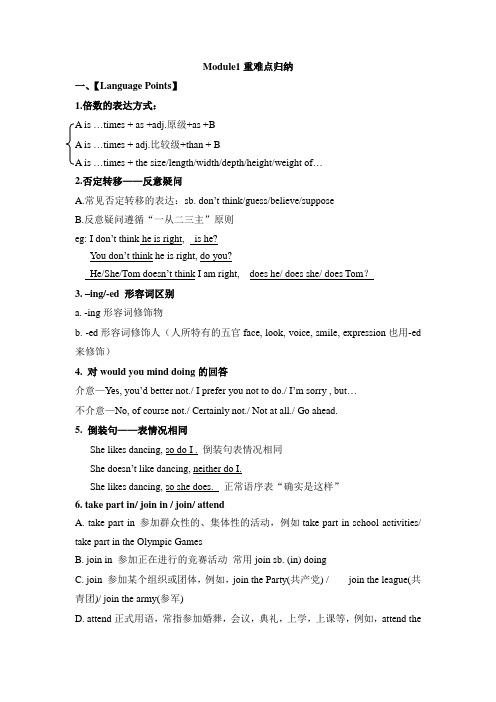
Module1重难点归纳一、【Language Points】1.倍数的表达方式:A is …times + as +adj.原级+as +BA is …times + adj.比较级+than + BA is …times + the size/length/width/depth/height/weight of…2.否定转移——反意疑问A.常见否定转移的表达:sb. don’t think/guess/believe/supposeB.反意疑问遵循“一从二三主”原则eg: I don’t think he is right, is he?You don’t think he is right, do you?He/She/Tom doesn’t think I am right, does he/ does she/ does Tom?3. –ing/-ed 形容词区别a. -ing形容词修饰物b. -ed形容词修饰人(人所特有的五官face, look, voice, smile, expression也用-ed 来修饰)4. 对would you mind doing的回答介意—Yes, you’d better not./ I prefer you not to do./ I’m sorry , but…不介意—No, of course not./ Certainly not./ Not at all./ Go ahead.5. 倒装句——表情况相同She likes dancing, so do I . 倒装句表情况相同She doesn’t like dancing, neither do I.She likes dancing, so she does. 正常语序表“确实是这样”6. take part in/ join in / join/ attendA. take part in 参加群众性的、集体性的活动,例如take part in school activities/ take part in the Olympic GamesB. join in 参加正在进行的竞赛活动常用join sb. (in) doingC. join 参加某个组织或团体,例如,join the Party(共产党) / join the league(共青团)/ join the army(参军)D. attend正式用语,常指参加婚葬,会议,典礼,上学,上课等,例如,attend thewedding (婚礼) attend the funeral(葬礼) attend class(上课) attend school(上学) 7. matter的用法It doesn’t matter if…如果…没关系Does it matter if…如果…有关系吗?It matters a lot if…如果…很要紧【Key Phrases】at the start/ beginning of 在…的开始/开端at the end of 在…的末尾academic subject学科the attitude to/towards 对…的态度in other words换句话说science/art subject 理/文科take part in/ join/ join sb. (in) doing/ attend 参加be far (away) from 离…远be near to 离…近divide sth. into = sth.be divided into 把…划分为behave in a polite way/method 以礼貌的方式做事move to 搬到…look forward to doing 期盼做某事the method of doing sth. 做…的方法feel/get/be bored with 对…感到厌倦nothing like什么也不如sth like 大约,有点像impress sb with sth.be impressed with 某人对…印象深刻introduce …to sb 把…介绍给…leave a deep impression on/ leave an unforgettable impression on …给某人留下深刻印象/…给某人留下难忘的印象We have fun.我们玩得高兴。
外研版高一英语必修1重难点知识归纳与总结.doc

必修一module 1---module6知识点总结Modulel重点短语:not far from 离.... 不远information from websites 网上的消息write down my thoughts about it 写下..... 的想法iave fun玩的高兴give instructions给出指示in a fun way以一种有趣的方式write a desciption of 写下 ......................... 的描述in other words 换句话说have / make an impression on /upon sb. 给某人留下印象take place 发生take part in 参加by oneself 独自at first / the end of / the start of 起先/ 在.... 结束时/ 在... 开始时nothing like与 .... 不同;没有.... 能比得上be different from 与.... 不同be impressed with/ by 被........ 所吸弓Idifferences beween/ among ........ 的差异introduce...to... 把.... 介绍....look foward to doing sth./ sth.期望做 ..... / 期望...impress sb. with sth.二impress sth.on /upon sb.使某人铭记i某事be simliar to 与.... 相似be divided into 被分成....be separated from 被和..... 分开mind doing sth. 介意做 ......重点句型1.In other words, there are three times as many girls as boys.倍数表达法:%1 A + be / V. + 倍数 + as +adj./ adv.原级 + as + B%1A+be/V.+ 倍数+ adj./ adv.比较级+than + B%1A+be / V. + 倍数+ the (size,weight,height,width,depth,lengh) + of + B2.Would you mind if I did ...?介意我做.. ?3.The teacher is a very enthusiastic woman called Ms.Shen.called Ms. Shen是过去分词作短语定语,修饰woman.与修饰词之间是被动关系。
外语教学与研究出版社高中英语必修1重难点解析1
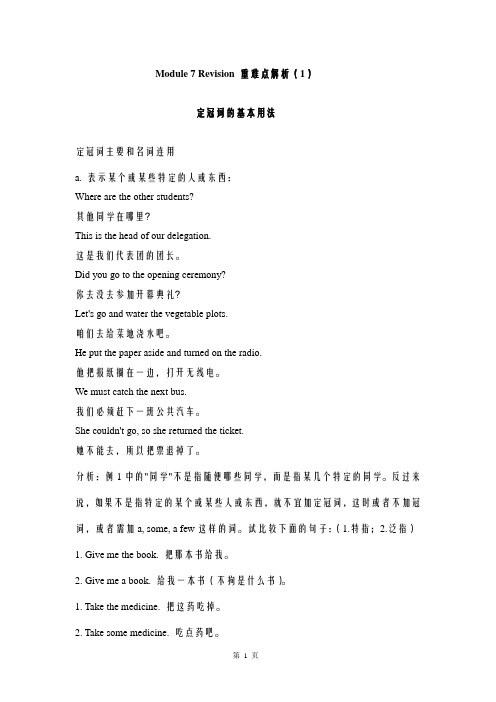
Module 7 Revision 重难点解析(1)定冝词的基本用法定冝词主要和名词连用a. 表示某个或某些特定的人或东西:Where are the other students?其他同学在哪里?This is the head of our delegation.这是我们代表团的团长。
Did you go to the opening ceremony?你去没去参加开幕典礼?Let's go and water the vegetable plots.咱们去给菜地浇水吧。
He put the paper aside and turned on the radio.他把报纸搁在一边,打开无线电。
We must catch the next bus.我们必须赶下一班公共汽车。
She couldn't go, so she returned the ticket.她不能去,所以把票退掉了。
分析:例1中的"同学"不是指随便哪些同学,而是指某几个特定的同学。
反过来说,如果不是指特定的某个或某些人或东西,就不宜加定冝词,这时或者不加冝词,或者需加a, some, a few这样的词。
试比较下面的句子:(1.特指;2.泛指)1. Give me the book. 把那本书给我。
2. Give me a book. 给我一本书(不拘是什么书)。
1. Take the medicine. 把这药吃掉。
2. Take some medicine. 吃点药吧。
1. Did you hear the talk given by Dr. Li?你听了李博士做的报告了吗?2. Do you often hear talks by foreign friends?你常听外国朋友做的报告吗?1. I liked the children's performances.我喜欢那些孩子们的表演。
外研版高中英语必修1 名师汇编:单元重难点详解
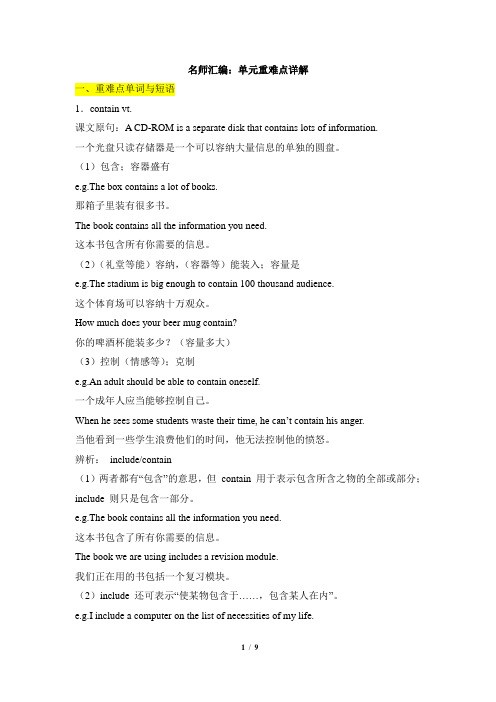
名师汇编:单元重难点详解一、重难点单词与短语1.contain vt.课文原句:A CD-ROM is a separate disk that contains lots of information.一个光盘只读存储器是一个可以容纳大量信息的单独的圆盘。
(1)包含;容器盛有e.g.The box contains a lot of books.那箱子里装有很多书。
The book contains all the information you need.这本书包含所有你需要的信息。
(2)(礼堂等能)容纳,(容器等)能装入;容量是e.g.The stadium is big enough to contain 100 thousand audience.这个体育场可以容纳十万观众。
How much does your beer mug contain?你的啤酒杯能装多少?(容量多大)(3)控制(情感等);克制e.g.An adult should be able to contain oneself.一个成年人应当能够控制自己。
When he sees s ome students waste their time, he can’t contain his anger.当他看到一些学生浪费他们的时间,他无法控制他的愤怒。
辨析:include/contain(1)两者都有“包含”的意思,但contain 用于表示包含所含之物的全部或部分;include 则只是包含一部分。
e.g.The book contains all the information you need.这本书包含了所有你需要的信息。
The book we are using includes a revision module.我们正在用的书包括一个复习模块。
(2)include 还可表示“使某物包含于……,包含某人在内”。
外研版英语必修一Module1-Module3重点知识总结
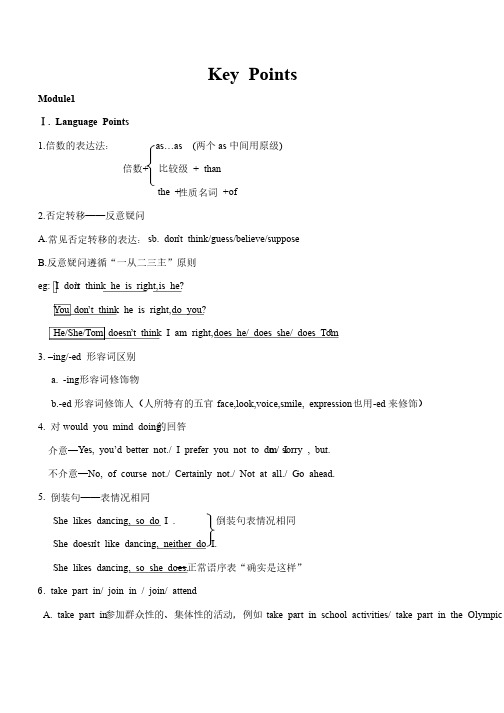
Key Points Module1 Ⅰ. Language Points 1.倍数的表达法:倍数的表达法: as as……as (两个as 中间用原级) 倍数+ 比较级比较级 + than the +性质名词性质名词 +of 2.否定转移——反意疑问否定转移——反意疑问A.常见否定转移的表达:sb. don ’t think/guess/believe/suppose B.反意疑问遵循“一从二三主”原则反意疑问遵循“一从二三主”原则eg: I don ’t think he is right, is he? You don You don’’t think he is right, do you? He/She/Tom doesn He/She/Tom doesn’’t think I am right, does he/ does she/ does Tom ?3. –ing/-ed 形容词区别形容词区别a. -ing 形容词修饰物形容词修饰物b.-ed 形容词修饰人(人所特有的五官face,look,voice,smile, expression 也用-ed 来修饰)来修饰)4. 对would you mind doing 的回答的回答的回答 介意—Yes, you’d Yes, you’d better not./ I prefer you not to do./ I better not./ I prefer you not to do./ I ’m sorry , but … 不介意—No, of course not./ Certainly not./ Not at all./ Go ahead. 5. 倒装句——表情况相同倒装句——表情况相同She likes dancing, so do I . 倒装句表情况相同倒装句表情况相同She doesn’t like dancing, neither do I. She likes dancing, so she does.—正常语序表“确实是这样”—正常语序表“确实是这样”6.6.take part in/ join in / join/ attend A. take part in 参加群众性的、集体性的活动,例如take part in school activities/ take part in the Olympic Games B. join in 参加正在进行的竞赛活动参加正在进行的竞赛活动 常用join sb. (in) doing 参加正在进行的竞赛活动C. join 参加某个组织或团体,例如,join the Party(共产党) / join the league(共青团)/ join the army(参军) D. attend正式用语,常指参加婚葬,会议,典礼,上学,上课等,例如,attend the wedding(婚礼) attend 常指参加婚葬,会议,the funeral(葬礼) attend class(上课) attend school(上学) 7. matter的用法的用法It doesn’t matter if…如果…没关系没关系Does it matter if…如果…有关系吗?有关系吗?It matters a lot if…如果…很要紧很要紧Ⅱ. Key Phrasesat the start/ beginning of 在…的开始/开端的末尾开端 at the end of 在…的末尾attitude to/towards 对…的态度换句话说的态度 in other words换句话说take part in/ join/ join sb. (in) doing/ attend 参加参加divide sth. into = sth. be divided into 划分为把…划分为move to 搬到…look forward to doing 期盼做某事期盼做某事feel/get/be bored with 对…感到厌倦感到厌倦be impressed with 某人对某人对…印象深刻印象深刻…给某人留下深刻印象/…给某人留下难leave a deep impression on/ leave an unforgettable impression on 忘的印象忘的印象用这种方式:in this way in this manner with this method by this means ——————一般现在时Ⅲ. Grammar——————一般现在时1.经常性、习惯性动作用一般现在时经常性、习惯性动作用一般现在时She goes to see the film once a week. He always/often/usually/sometimes/never/seldom talks with others. The teacher said that the earth travels around the sun. The light travels faster than sound. I will go to Xi’an if it doesn’t rain tomorrow. t talk with your mouth full. The room is bright with all the lights on. Ms. Liu comes into classroom with a book in her hand. The mother left, with the baby crying. b. 被动——done He is sleeping with the window closed. c. 还没做还没做With so much homework to do, I can’t go out. that……﹠so that 2. so…thatthat……如此…以致于…A. so…thatShe explains English grammar so clear that even I can understand it. B. so that 引导结果状语从句,译为“因此”引导结果状语从句,译为“因此”引导结果状语从句,译为“因此”’t feel completely stupid. Mrs. Liu just smiles, so that you don3.appreciate 的用法的用法A. appreciate (one’s) doing 感激(某人)做某事感激(某人)做某事I appreciate your helping me. …如果…我将感激不尽B. I would appreciate it if我将感激不尽I would appreciate it if you help me. 4. admit 的用法的用法A. admit doing 承认做了某事承认做了某事承认做了某事He admitted breaking the window. B. sb. be admitted to/into 被…录取或接收录取或接收I was admitted to/into Peking University. 5. prefer 的用法的用法 (preferring, preferred) A. prefer sth. 更喜欢更喜欢…—Which one do you prefer, the apple or the pear? —I prefer apple. B. prefer sth to sth. 比起…更喜欢…Rather than talk with us, he prefers to play alone. admit/appreciate/avoid/consider/mind/look forward to/be busy/be good at +doing sb. need to do 某人必须做某事 sth. need doing such little children/ such great progress(such little:这么小) so little+不可数名词不可数名词 “如此少”eg: do you think/believe/guess/suppose, 插入语最大的特点是后接陈述句插入语最大的特点是后接陈述句 Who do you think you are? What do you guess she likes? When do you suppose we should set off(出发)?Where do you think we can go? 划线处都应为陈述句划线处都应为陈述句eg: The dog approached the garden when the girl ran out. China is larger than other countries.(population are peasants.(4. afford 的用法的用法sth. can/can can/can’’t/be able to/ be not able to afford 意为“能够/不能支付得起”不能支付得起”to do sth. eg: I can afford this coat. = I can afford to buy this coat. 5. “许多大,大量的”“许多大,大量的”A. + 可数名词复数:可数名词复数: many a good/ great many a large/ great number of 谓语动词用复数谓语动词用复数There are a great many books in our school ’s library. A number of teachers in our school are men. B. + 不可数名词:much a great deal of a large amount of 谓语动词用单数谓语动词用单数A great deal of water in our city is wasted every year. A large amount of money was lost. C. + 两可:a lot of=lots of plenty of (这两个短语作主语时谓语动词形式依据名词是否可数来确定) a large quantity of (作主语,谓语动词用单数) large quantities of (作主语,谓语动词用复) A lot of students in this school have passed the exam.(后接了可数名词复数,所以谓语动词用复数) Lots of food is eaten by the guests.(客人) (后接了不可数名词,所以谓语动词用单数)A large quantity of milk is wasted. (a large quantity of 作主语,谓语动词用单数) Large quantities of milk are wasted. (large quantities of 作主语,谓语动词用复数) 6. 多个形容词作主语时的顺序多个形容词作主语时的顺序 :“限冠形龄颜国材”“限冠形龄颜国材”Ten strong young Chinese students are taking part in the boat race. 7. 半系动词:包括5个感官动词(look, sound, smell, taste, feel); remain; keep 最大特点:后接形容词,The 100-year-old architecture still remains new. eg: It is the first time that I have visited China. eg: It was the first time that I had visited China. 从句,从句通常用一般过去式从句,从句通常用一般过去式eg: It is six years since we saw each other last year. I have been to France twice. (make/ earn money by doing sth. 等一会儿例如 wait for a while 等一会儿挣钱 such as 例如靠…挣钱feel fortunate doing sth. 做某事感到很幸运做某事感到很幸运 remain to be done 尚待,有待为生尚待,有待 live on 以…为生so far / up to now/ till now 到目前为止(完成时态标志词除了这三个还有:since, already, yet, never) 。
高中外研英语必修一知识点总结

高中外研英语必修一知识点总结高中外研英语必修一是高中英语课程的重要组成部分,它是英语学习中的基础知识点,也是以后英语学习的基石。
这里将对必修一的知识点进行总结,并做一些重点的解析。
一、单词与语法1. 个人信息首先是个人信息的表达,包括姓名、国籍、年龄、出生地、家庭住址、电话号码等。
结合这些内容,我们还要掌握人称代词,如I、you、he、she、it、we、they等。
另外还有一些常见的动词,如be、have、do、like等。
2. 介绍自己然后是介绍自己的能力、兴趣爱好、工作经历等,这涉及到比较复杂的语法结构,如主语、谓语、宾语、表语等,以及常见的分词、形容词和副词等。
3. 基本词汇除了个人信息和介绍自己,还有一些基本词汇需要掌握,包括数字、时间、颜色、天气、地点、方位、交通工具等。
同时还需要学习一些常见的词汇,如家庭成员、学校、电影、运动等。
二、阅读理解1. 阅读材料的选择和分析在阅读理解中,我们需要选择适当的材料,并进行分析。
在选择材料时,需要考虑自己的英语水平和词汇量,避免选择过于复杂或过于简单的材料。
在分析材料时,需要注意熟练掌握阅读技巧,如推断、判断、比较、总结、归纳、分析等。
2. 阅读材料的背景知识在阅读理解中,还需要掌握一些背景知识,如历史、文化、科学和地理等。
这些知识可以帮助我们更好地理解阅读材料,也可以提高我们的语言表达能力和跨文化交流能力。
三、写作表达1. 写作的思路和组织在写作表达中,我们需要掌握一定的写作思路和组织能力,如文体、结构、段落、主题等。
要能够进行写作计划,尽可能使用简单的语言表达,并避免使用过于复杂或过于生僻的词汇。
2. 写作的语法规则和词汇此外,在写作表达中,还需要注意语法规则和词汇的使用。
要能够正确使用各种语法结构和动词时态,避免出现语法错误。
同时,要阅读并学习一些例文,熟悉常见的写作词汇和表达习惯。
四、语音和发音1. 音标和发音规则在语音和发音方面,我们需要掌握音标和发音规则。
高一英语外研版必修一英语重难点解析
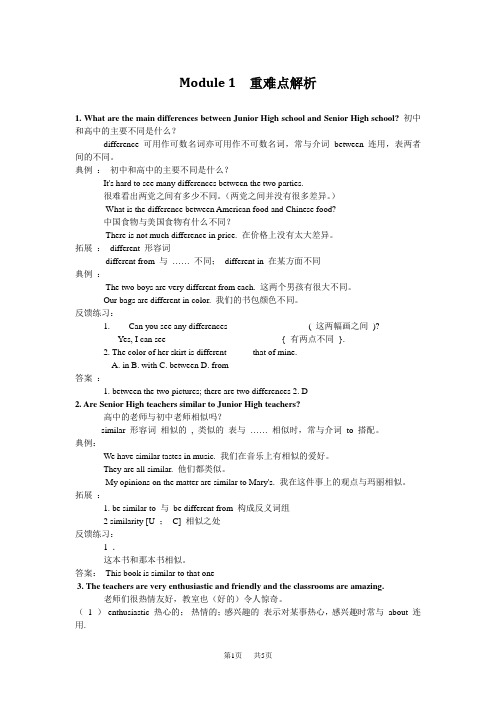
Module 1 重难点解析1. What are the main differences between Junior High school and Senior High school?初中和高中的主要不同是什么?difference 可用作可数名词亦可用作不可数名词,常与介词between 连用,表两者间的不同。
典例:初中和高中的主要不同是什么?It's hard to see many differences between the two parties.很难看出两党之间有多少不同。
(两党之间并没有很多差异。
)What is the difference between American food and Chinese food?中国食物与美国食物有什么不同?There is not much difference in price. 在价格上没有太大差异。
拓展:different 形容词different from 与…… 不同;different in 在某方面不同典例:The two boys are very different from each. 这两个男孩有很大不同。
Our bags are different in color. 我们的书包颜色不同。
反馈练习:1. ----- Can you see any differences __________________( 这两幅画之间)?-----Yes, I can see __________________________{ 有两点不同}.2. The color of her skirt is different _____ that of mine.A. inB. withC. betweenD. from答案:1. between the two pictures; there are two differences2. D2. Are Senior High teachers similar to Junior High teachers?高中的老师与初中老师相似吗?similar 形容词相似的, 类似的表与…… 相似时,常与介词to 搭配。
外研社高一英语必修一unit1说课稿资料讲解

教学重难点
教学重点: 依据课程标准要求和本节教材实际, 并结合学生的实际,本节课一是要兴趣为主, 二是训练学生的口语表达能力。
教学难点:一是新词汇较多,较难掌握;二是 通过学生素质参差不齐,口语表达部分有可能 达不到效果。
本堂课以启发式教学思想作为指导思想,讲授 法与陶冶法相结合,通过教师口头讲述与课外 材料的阅读与欣赏,激发学生兴趣,开展课堂 积极活跃的学习;
ending~
此课件下载可自行编辑修改,仅供参考! 感谢您的支持,我们努力做得更好!谢谢
教学目标
知识与技能目标: 1.学习掌握与学科相关的词汇并学会表达自己 的喜好。 2.通过回答Speaking模块提出的问题,对中美高中学习 方式的区别进行口头描述
过程与方法目标: 1.通过听,读,英汉互译的小卡片游戏等活动学习词汇。 2.通过小组抢答的方式完成中美高中差异的讨论。
情感、态度与价值观目标: 通过这一课的学习,激发学习的积极性,克服部分同 学学英语的畏难心理,为今后的学习打下好的基础。
另外,还采取了讨论法,以小组为单位完成任 务单位,学生在课堂中进行感知、体验、实践、 参与合作,培养学生实践与合作能力,为今后 学打下良好基础。
选择教学手段时,考虑到目的性、实用性、可 操作性和新颖性,教具使用如下:
1.PPT演示 2.用以播放听力的录音机 3.写有本课重点词汇的硬纸卡片 4.小组竞争优胜组奖品
science langu academ your favourite Your
subjects ages ic
ect
difficult
subjects
subjects
教师抽取学生进行对话 速记小卡片小组抢答
Speaking 根据图片对中美高中的区别进行口头描述
外研版高中英语必修1Module1_Reading重难点词汇详解
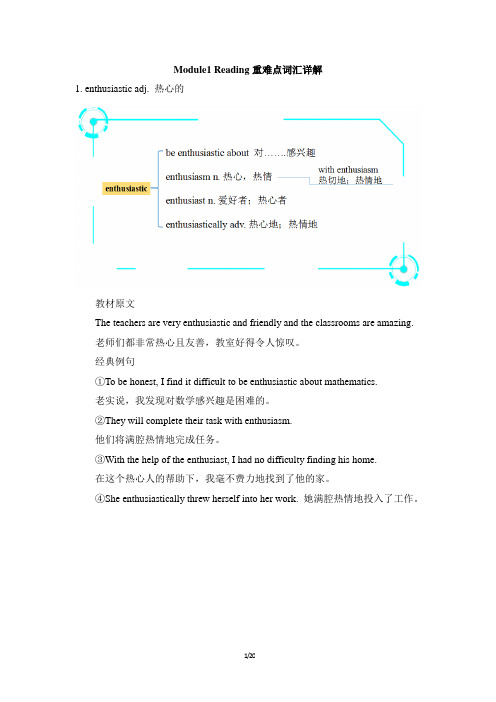
Module1 Reading重难点词汇详解1. enthusiastic adj. 热心的教材原文The teachers are very enthusiastic and friendly and the classrooms are amazing.老师们都非常热心且友善,教室好得令人惊叹。
经典例句①To be honest, I find it difficult to be enthusiastic about mathematics.老实说,我发现对数学感兴趣是困难的。
②They will complete their task with enthusiasm.他们将满腔热情地完成任务。
③With the help of the enthusiast, I had no difficulty finding his home.在这个热心人的帮助下,我毫不费力地找到了他的家。
④She enthusiastically threw herself into her work. 她满腔热情地投入了工作。
2. amazing adj. 令人吃惊的;令人惊讶的教材原文The teachers are very enthusiastic and friendly and the classrooms are amazing.老师们都非常热心且友善,教室好得令人惊叹。
经典例句①I think you are doing an amazing job with those children.我想你和那些孩子在做一件令人惊讶的工作。
②I was amazed by his calmness.我对他的镇定感到吃惊。
③To my amazement, I came first.令我感到惊讶的是,我第一个到了。
④She gazed at him in amazement.她惊愕地注视着他。
⑤And by doing so, I changed an unhappy experience into the most amazing adventure of my life. 通过这样做,我将不愉快的经历变成了最令人惊叹的人生冒险。
教材解析高中英语必修1 外研版
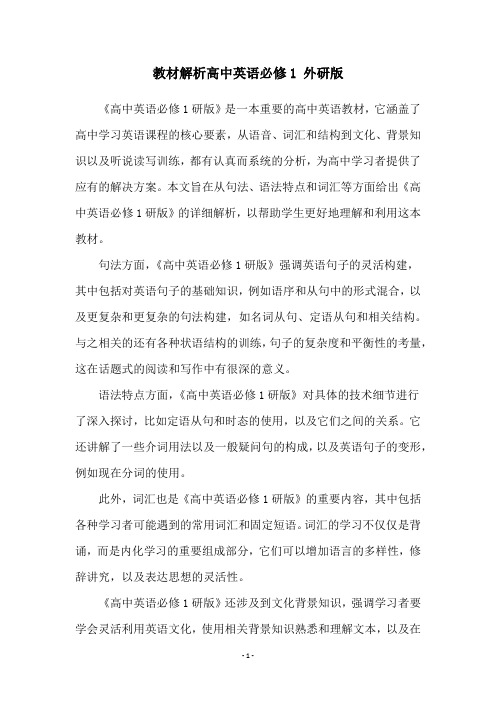
教材解析高中英语必修1 外研版《高中英语必修1研版》是一本重要的高中英语教材,它涵盖了高中学习英语课程的核心要素,从语音、词汇和结构到文化、背景知识以及听说读写训练,都有认真而系统的分析,为高中学习者提供了应有的解决方案。
本文旨在从句法、语法特点和词汇等方面给出《高中英语必修1研版》的详细解析,以帮助学生更好地理解和利用这本教材。
句法方面,《高中英语必修1研版》强调英语句子的灵活构建,其中包括对英语句子的基础知识,例如语序和从句中的形式混合,以及更复杂和更复杂的句法构建,如名词从句、定语从句和相关结构。
与之相关的还有各种状语结构的训练,句子的复杂度和平衡性的考量,这在话题式的阅读和写作中有很深的意义。
语法特点方面,《高中英语必修1研版》对具体的技术细节进行了深入探讨,比如定语从句和时态的使用,以及它们之间的关系。
它还讲解了一些介词用法以及一般疑问句的构成,以及英语句子的变形,例如现在分词的使用。
此外,词汇也是《高中英语必修1研版》的重要内容,其中包括各种学习者可能遇到的常用词汇和固定短语。
词汇的学习不仅仅是背诵,而是内化学习的重要组成部分,它们可以增加语言的多样性,修辞讲究,以及表达思想的灵活性。
《高中英语必修1研版》还涉及到文化背景知识,强调学习者要学会灵活利用英语文化,使用相关背景知识熟悉和理解文本,以及在不同文化环境中表达思想。
例如,可以在文中提供一些历史人物或地点,或一些熟悉的英语文化以及其背后的宗教和文化思想,让学生在理解文本的同时也能理解英语思想的文化传承。
值得注意的是,《高中英语必修1研版》也更加重视听说读写训练,与实际的情景和文本对话相结合,以培养学习者的口语语言能力,理解和传达英语信息的能力。
为了提高学生的英语实践能力,课本还设计有各种听力和口语话题,探究和深入思索话题。
此外,写作也是本书注重的重点之一。
它提供了大量的写作技巧和提示,培养学生正确地运用语言表达思想,准确而灵活的组织语言等技能。
外研版必修一3单元重难知识点详解

Module 3 My First Ride on a Train重点词汇1.expert n.专家2.midnight n.半夜3.scenery n.风景;景色4.shoot vt.射杀5.journey n.旅程6.train vt.训练7.event n.事件8.ceremony n.仪式重点短语get on, refer to, out of date,be short for重点句型1.What a/an (adj.) + 单数名词+主语+谓语!……多么……啊!2. 过去分词作定语3. What do you think of....?4. the first time引导句子知识讲解重点短语get on【原句回放】We got on in Sydney and we got off in Alice Springs, right in the middle of Australia, more than four thousand kilometers away. 我们在悉尼上火车,在爱丽斯泉下车,恰好位于澳大利亚中部,在四千公里之外。
【点拨】get on上(车、船等);进展,进行;相处get on/off表示“上/下车”时,常用于bus, train, bike, ship, horse等;用get in(into)/out of(from)表示从air, car等进出。
Everything was getting on very well.一切进展非常顺利。
How are you getting on/along with your English?你的英语学得怎么样?He is not an easy man to get on with.他不好相处。
The workers couldn’t get on for lack of materials.由于缺乏材料,工人们无法进行下去。
外研版必修一1单元重难知识点详解
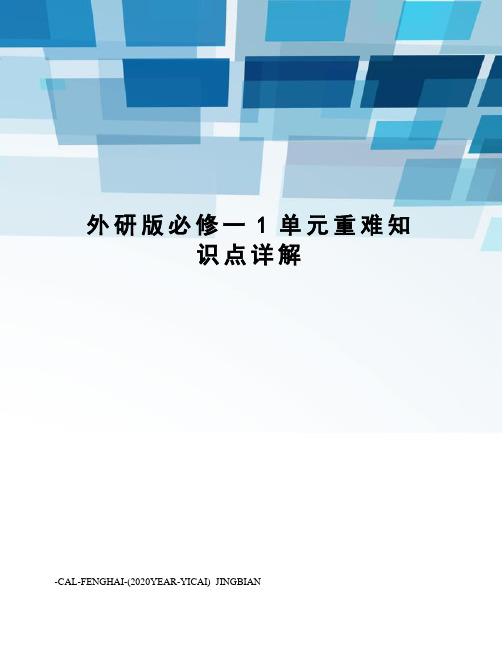
外研版必修一1单元重难知识点详解-CAL-FENGHAI-(2020YEAR-YICAI)_JINGBIANModule 1 My First Day at Senior High高频单词n.方法 n. 态度 n.消息n.误解 vt.包含 n.技术vi.搬家;移动 n.享受;乐趣高频短语nothing like, in other words, have fun高频句型1.with结构2.否定转移3.倍数的表达法要点精析高频短语nothing like【原句回放】We’re using a new textbook and Ms Shen’s method of teaching is nothing like that of the teachers at my Junior High schools. 我们用的是一本新教材, 沈老师的教方法完全不同于我初中老师的教学方法。
【点拨】nothing like完全不像;没有比(某事)更好的了It looks nothing like a horse. 它看上去根本不像一匹马。
There is nothing like a hot bath after a day’s work. 一天工作之后,没什么比洗个热水澡更舒服的了。
【拓展】that可用来代替前面提到的事物,以避免重复。
The size of my shoes is larger than that of yours. 我的鞋的号码比你的大。
当指代物为复数形式时, 用those。
The apples in the basket are bigger than those on the floor. 篮子里的苹果比地板上的大。
in other words【原句回放】In other words, there are three times as many girls as boys. 换言之,女生人数是男生的三倍。
外研版高中英语必修1 Module6 名师汇编:单元重难点详解
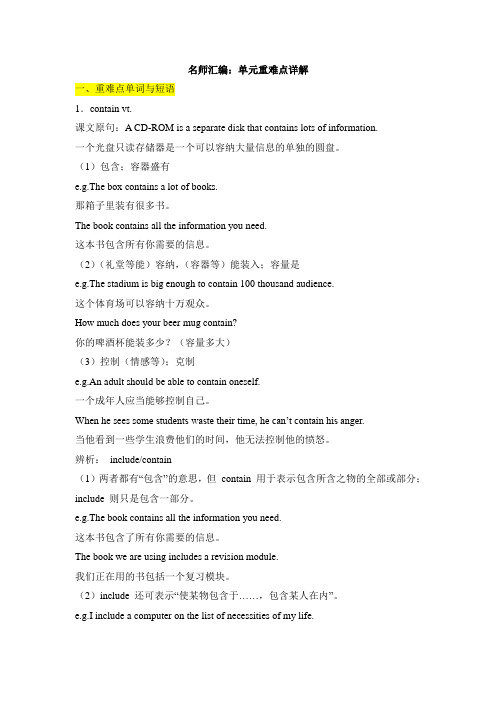
名师汇编:单元重难点详解一、重难点单词与短语1.contain vt.课文原句:A CD-ROM is a separate disk that contains lots of information.一个光盘只读存储器是一个可以容纳大量信息的单独的圆盘。
(1)包含;容器盛有e.g.The box contains a lot of books.那箱子里装有很多书。
The book contains all the information you need.这本书包含所有你需要的信息。
(2)(礼堂等能)容纳,(容器等)能装入;容量是e.g.The stadium is big enough to contain 100 thousand audience.这个体育场可以容纳十万观众。
How much does your beer mug contain?你的啤酒杯能装多少?(容量多大)(3)控制(情感等);克制e.g.An adult should be able to contain oneself.一个成年人应当能够控制自己。
When he sees s ome students waste their time, he can’t contain his anger.当他看到一些学生浪费他们的时间,他无法控制他的愤怒。
辨析:include/contain(1)两者都有“包含”的意思,但contain 用于表示包含所含之物的全部或部分;include 则只是包含一部分。
e.g.The book contains all the information you need.这本书包含了所有你需要的信息。
The book we are using includes a revision module.我们正在用的书包括一个复习模块。
(2)include 还可表示“使某物包含于……,包含某人在内”。
- 1、下载文档前请自行甄别文档内容的完整性,平台不提供额外的编辑、内容补充、找答案等附加服务。
- 2、"仅部分预览"的文档,不可在线预览部分如存在完整性等问题,可反馈申请退款(可完整预览的文档不适用该条件!)。
- 3、如文档侵犯您的权益,请联系客服反馈,我们会尽快为您处理(人工客服工作时间:9:00-18:30)。
重难点解析Module 11. What are the main differences between Junior High school andSenior High school? 初中和高中的主要不同是什么?difference 可用作可数名词亦可用作不可数名词,常与介词between 连用,表两者间的不同。
典例:初中和高中的主要不同是什么?It's hard to see many differences between the two parties.很难看出两党之间有多少不同。
(两党之间并没有很多差异。
)What is the difference between American food and Chinese food?中国食物与美国食物有什么不同?There is not much difference in price. 在价格上没有太大差异。
拓展:different 形容词different from 与…… 不同;different in 在某方面不同典例:The two boys are very different from each. 这两个男孩有很大不同。
Our bags are different in color. 我们的书包颜色不同。
反馈练习:1. ----- Can you see any differences __________________( 这两幅画之间)?-----Yes, I can see __________________________{ 有两点不同}.2. The color of her skirt is different _____ that of mine.A. inB. withC. betweenD. from答案:1. between the two pictures; there are two differences2. D2. Are Senior High teachers similar to Junior High teachers?高中的老师与初中老师相似吗?similar 形容词相似的, 类似的表与…… 相似时,常与介词to 搭配。
典例:We have similar tastes in music. 我们在音乐上有相似的爱好。
They are all similar. 他们都类似。
My opinions on the matter are similar to Mary's. 我在这件事上的观点与玛丽相似。
拓展:1. be similar to 与be different from 构成反义词组2 similarity [U ;C] 相似之处反馈练习:1 .____________________________________这本书和那本书相似。
答案:This book is similar to that one3. The teachers are very enthusiastic and friendly and theclassrooms are amazing.老师们很热情友好,教室也(好的)令人惊奇。
(1 )enthusiastic 热心的;热情的;感兴趣的表示对某事热心,感兴趣时常与about 连用典例:The football star got an enthusiastic reception. 那位足球明星受到了热情的招待。
All teachers in our school are enthusiastic. 我们学校所有的老师都很热情。
Xiao'ming is very enthusiastic about the concert. 小明对这场音乐会很感兴趣。
(2 ).friendly 友好的表对某人友好时通常与to 连用典例:My classmates are all very friendly. 我的同学都很友好。
There was a friendly smile on her face. 她脸上挂着友好的微笑。
People in Qingdao are always friendly to visitors. 青岛人对游客很友好。
(3 )amazing 形容词(好到)令人惊奇的;令人吃惊的;难以相信的典例:He is an amazing player to watch. 他是一个(好的)让人惊奇的运动员。
Something amazing happened last night. 昨天晚上发生一件令人惊奇的事情。
反馈练习:1 .____________________________________汤姆给我们讲了很多令人难以置信的故事。
答案:Tom told us a lot of amazing stories.4. The teacher is a very enthusiastic woman called Ms Shen.老师是一个非常热情的姓申的女士。
called 在此处为过去分词作定语,修饰the woman ;同named; 可译为“被称/ 叫做…… ;名叫…… ”典例:A girl named Wangping won the game. 一个叫王萍的女孩赢了比赛。
Do you know a person named John Wilson? 你知道一个叫约翰。
威尔逊的人吗?反馈练习:____________________________________他们有一个叫朋朋的三岁的儿子。
答案:They have a three-year-old son called Pengpeng.5. We are using a new textbook and Ms Shen's method is nothing likethat of the teachers at my Junior High school.我们用新的教科书,而且申老师的教学方法和我们初中老师的一点也不同。
nothing like(1 )。
一点儿也不像典例:He is nothing like his brother. 他和他的弟弟一点也不像。
Your mobile phone is nothing like mine. 你的手机和我的一点也不像。
(2 )。
没有比某事更好的了典例:There is nothing like a hot bath after a day's work.一天工作之后,没什么比洗个热水澡更舒服的了。
There is nothing like music when you are tired. 当你疲劳的时候,没有什么比音乐更好的了。
that 可用来代替前面提到的物体,避免重复。
( 注意,当指代物为复数名词时,用those)典例:The climate of Beijing is quite different from that of Qingdao.北京的气候与青岛(的气候)有很大不同。
The size of my shoes is larger than that of yours. 我的鞋的号码比你的大。
反馈练习:1; ____________________________________His way of life is nothing like his father's.2; ______________________________________.我家乡的建筑和北京的一点也不同。
答案:1; 他的生活方式和他父亲的一点也不同。
2; The buildings in my village are nothing like those in Beijing.6 .And we have fun. 我们很开心。
fun 不可数名词乐趣;玩笑;娱乐(在美语中有时可用作形容词,表“有趣的”)典例:What fun it is to do sth! 做某事是多么快乐的事啊!What fun it is to visit Suzhou gardens! 参观苏州园林是多么令人开心的事啊!---We are going to have a party. 我们计划开一个晚会。
---Have fun! 玩的开心一点。
We do this in a fun way. 我们以一种有趣的方式反馈练习:1:______________________________________.每天学习一些新东西是多么快乐的事啊!答案:What fun it is to learn something new every day!7. In other words, there are three times as many girls as boys.换句话说,女生是男生的三倍。
(1 ). in other words 换句话说I don't want to leave you here. In other words, I want you to runaway with us too.我不想让你留在这儿。
换句话说,我想让你和我们一起逃走。
拓展:that is to say 也就是说in a word 总之;总起来说(2 )倍数表达法表示 A 是 B 的几倍时,可用下列几种方法表达① A+ B + 倍数+ as B典例:There are half as many students in this school as in that one.这所学校的学生数是那所学校的一半。
The husband is twice as old as the wife. 丈夫年龄是妻子的两倍。
② A + B + 倍数…than B典例:The population in this town is three times more than it was in 1980.这个小镇的人口是它在1980年时的三倍。
The laptop is three times more expensive than that desktop.这台手提电脑比那台台式电脑贵三倍。
③ A + be + 倍数+ the size/len gth/height/width…of B典例:Our school is three times the size of yours.我们的学校面积是你们学校的三倍。
反馈练习:1:______________________________________.---------这所房子(面积)是那所的两倍大。
